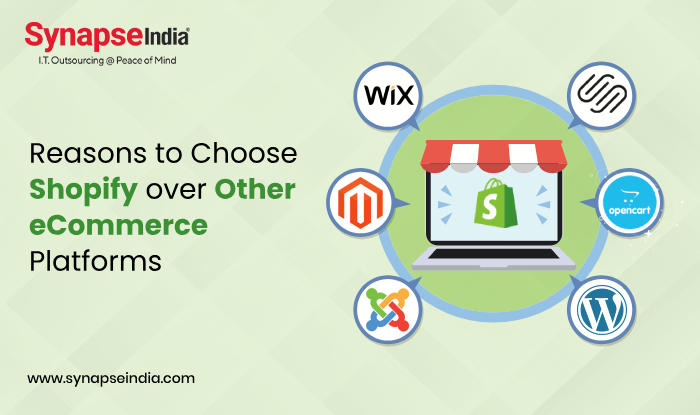 10 Jan 2024
10 Jan 2024“Due to its features, user-friendly interface, hosted solution, inbuilt marketing tools, speed & security and robust scalability, Shopify stands out among other eCommerce platforms.”

In present times websites are becoming an important part of online business. Surviving and succeeding in this online business is not easy. This scenario has changed for a few years, especially after the pandemic. The landscape of online shopping has surged with vast numbers, which is the reason why companies are looking to make their retail business online. Companies that are running online businesses making a large number of profits and parallel customers are getting more convenient options.
Shopify e-commerce store is one of the popular platforms used and managed by many small and large businesses. As a shop owner if you're looking for any e-commerce retail store option, then Shopify is the one. But, with time many other platforms have emerged in the market. Here we will discuss a comparison between Shopify and other e-commerce platforms. Let’s move ahead and find out the prominent store that stands as a great option for an e-commerce store.
Here are a few reasons let’s understand why Shopify is considered as best e-commerce store:
Selecting the right theme is important for your Shopify site, as thousands of themes are available in Shopify. With multiple themes, styles, and layouts for each condition, it is adaptable in different ways.
Being one of the most popular platforms it is very easy to set up. Shopify e-commerce platform is one of the best options for those customers who need a complete package without any details identified with the turn of facilitating and events in the online store. It offers software and hosting which is required during dispatching of the site.
Shopify development in its platform offers secure and reliable options which makes it the best option for private firms to manage their retail store. also, it is consistent on the website which makes it easily accessible and facilitates great updates and support.
As an excellent hosted solution, Shopify has a great equipment-handling foundation for programming. This gives it a stage of super-quick stacking speed and internet business made it load fast.
While setting up any e-commerce store the foremost thing we look for is SEO friendliness which helps the web search tool amicable. Optimizing significantly guarantees the site which helps customers to start looking for more items. Shopify is equipped with configuration page missions, which is a major factor in distinguishing it from other e-commerce platforms.
Above we have read the factors and features of the Shopify e-commerce store. Now let's understand the major differences that make the Shopify platform different from others. Let’s find out the comparison between, Shopify vs Magento, and Shopify vs WooCommerce, to find out the more suitable platform.
| Feature | Shopify | Magento | WooCommerce |
|---|---|---|---|
| Ease of Use | Beginner-friendly, easy setup and management. | The steeper learning curve requires technical knowledge. | User-friendly for WordPress users. |
| Cost | Monthly subscription fees, transaction fees | Community Edition is free, but hosting costs apply. | Free WordPress plugin, with hosting and optional extensions. |
| Scalability | Suitable for small to medium-sized businesses. | Suitable for large enterprises and complex e-commerce requirements. | Scalable, suitable for small to large businesses. |
| Hosting | Fully hosted solution. | Requires external hosting. | Self-hosted on WordPress. |
| Themes | Provides a range of customizable themes. | Highly customizable. | Integrates seamlessly with WordPress themes. |
| Security | Secure with regular updates and security patches. | Secure, but require active monitoring and updates. | Security is dependent on WordPress |
| Payment Gateways | Wide range of payment gateways supported. | Supports multiple payment gateways. | Compatible with various payment gateways. |
| Integration | Extensive app store for integrations. | Open architecture allows integration. | Seamless integration with WordPress plugins. |
When choosing the best Shopify development company few factors should be considered to make your store successful. Consider the following factors when making your decision:
Look for companies with a proven track record in Shopify development. Experience often translates to a better understanding of the platform and its capabilities.
Review the company's portfolio and case studies to assess the quality of their previous Shopify development projects. This gives insights into their capabilities and design aesthetics.
Read client reviews and testimonials to gauge client satisfaction and the company's ability to meet expectations.
Check if the company has Shopify certifications, which indicate a commitment to staying updated with the latest platform features and best practices.
Ensure the company has expertise in customizing Shopify development stores based on specific business requirements. This includes design, functionality, and integrations.
Shopify offers a variety of extensions (also known as apps) that enhance the functionality and features of your online store. Some major Shopify extensions include:
Facilitates dropshipping by importing and managing products from AliExpress.
Optimizes your store for search engines, helping improve rankings.
Syncs customer data and allows for targeted email marketing campaigns.
Enables upselling and cross-selling to increase average order value.
Manages product reviews and allows you to showcase customer testimonials.
Provides post-purchase upsell and cross-sell offers to increase revenue.
A suite of tools for email marketing, exit popups, and other conversion optimization features.
Enables drag-and-drop page building for creating custom landing pages.
The choice between Shopify and other eCommerce platforms depends on your specific business needs, technical requirements, and long-term goals. Shopify development offers a user-friendly interface, extensive app ecosystem, and scalability. Its hosted nature simplifies maintenance but might limit customization for some. Other platforms like WooCommerce, Magento, and BigCommerce provide different trade-offs in terms of flexibility, control, and complexity. Consider factors like budget, technical expertise, and desired features to determine the platform aligning best with your e-commerce objectives.


